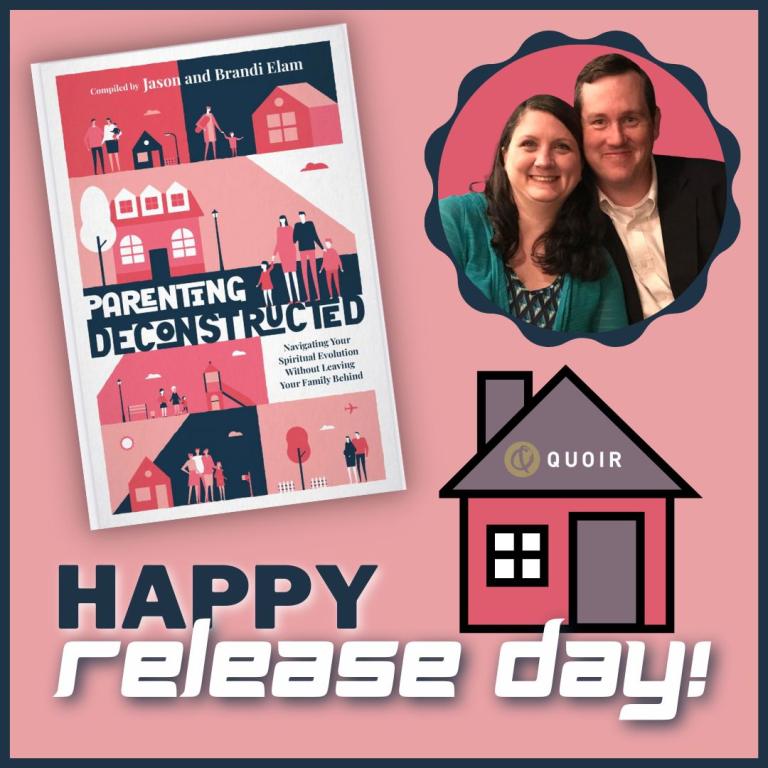Well over a year ago, my friend and fellow Patheos columnist, Jason Elam, asked me to submit a chapter for his book, Parenting Deconstructed. So, I did. Then I, along with another Patheos columnist, Keith Giles, took over the publishing company that was going to publish said book. Now, the book is officially available, and I’d like to include a portion of my chapter for you. Enjoy!!!
Not only can discipline be instilled without including corporal punishment, the science says that physical punishment should never be used. According to the American Academy of Pediatrics, “Aversive disciplinary strategies, including all forms of corporal punishment and yelling at or shaming children, are minimally effective in the short-term and not effective in the long-term. With new evidence, researchers link corporal punishment to an increased risk of negative behavioral, cognitive, psychosocial, and emotional outcomes for children.”5 The American Psychological Association is in agreement. Writing for The Monitor, Brendan L. Smith cites various professionals, including University of Michigan’s Sandra Graham-Bermann, PhD, Yale’s Alan Kazdin, PhD, and University of Connecticut’s Preston Britner, PhD, who all agree that physical punishment causes long-lasting harm.6 Smith concludes: “Many studies have shown that physical punishment—including spanking, hitting and other means of causing pain—can lead to increased aggression, antisocial behavior, physical injury and mental health problems for children.”7
Unfortunately, as Smith would later point out, roughly two-thirds of Americans still approve of parents spanking their kids.8 Why is this the case? I can only guess. To my mind, the reasons are at least two-fold.
Old-Time Religion
The first reason I believe the majority of Americans still support parents hitting—ahem, spanking—their children is because it goes hand in hand with their religion. What I mean is that their theology matches up with physical punishment. Think about it. When you imagine what type of God most people believe in, what image comes to mind? Unless you’ve deconstructed your old-timey religious views, you probably picture a judge. Perhaps you imagine a big white dude in the sky, meting out punishment on the so-called wicked. I’m guessing you believe there is an eternal hell for those who don’t make the cut. I could continue, but you probably get the point: We parent in the same way our God “parents” us.
The reason for this is pretty simple. We are mimetic beings. If you’ve read my book, Heretic!, you know what I mean by that. We imitate those whom we look up to. If our model of desire dresses a certain way, we dress a certain way. If our model of desire has a certain car, we desire a certain car. If our God is a punitive disciplinarian, we tend toward being a punitive disciplinarian. And frankly, the God of many a Christian is just that—perhaps loving when he wants to be but cross him, and you’ll get his more wrathful and vengeful side.
Change is Hard
The second issue I see when it comes to our society’s insistence on hitting kids is that change is difficult. If you are thirty or forty or older, you probably grew up in a home where spanking was a common practice. That’s because our parents, the so-called Baby Boomers, were raised by parents who hit them with all sorts of household items—spatulas, flip-flops, whatever happened to be in their hands at the time. Our parents generally moved away from that a bit and just used their hands or, at worst, a belt. And now, hopefully, we can start moving away from that outdated idea and embrace a more compassionate, science-driven model.
Again though, change is hard and turning a big ship takes time. It takes time to educate people on this issue, so all I can say is that if you are reading this and you agree with me, be that change. Start in your own home and then move outside your borders. The more of us who do that, the quicker that needed change will come.
Compassionate Inclusion, Compassionate Discipline
Okay, so it’s obvious that this chapter is not going to argue in favor of either limited inclusion or corporal punishment. That much is clear. But what do we replace these ideas with? What do we replace top-down authoritarianism with? How do we go about teaching our children to include everyone, regardless of race, religion, color, creed, or sexual orientation? Also, how do we discipline our children compassionately, without using physical violence, harsh language, or even threats? Well, that’s going to take some creativity and patience, but in the end will hopefully be well worth it.
First off, when it comes to inclusion and whom our children accept, we probably don’t have to teach them much. For many, it will be more about unteaching. As I said earlier, children tend to approach the world with awe and wonder. It’s only when we impress upon them our messed-up ideas that they turn into little tyrants. If we remove our need to make them think in certain ways, they tend to be much more well-rounded and accepting.
Take, for instance, my daughter Elyse. We’ve never necessarily taught her to affirm the LGBTQIA+ community. She just knew it was right to accept who people are. Full stop. When I came out to her as bisexual, then, her response was, “So?” Not because she doesn’t care about me, but because it’s such a non-issue that she couldn’t understand why I thought it was newsworthy. For me to accept myself, on the other hand—given that I was taught anything other than hetero is sinful—it took much more time and effort. For her, it was a no brainer.
Focusing now on discipline: This is where many need to take a one-eighty and become way more inclusive. What I mean is that when you discipline your children, you include them in the process. It’s never a “power over” thing, but a “power with” thing. “Power over” is the old model. That model uses phrases like, “Because I said so.” That model is all about telling children what to do because you are their parent, and they should blindly follow your authority. In contrast, when you have a “power with” model, you stand alongside them and help them see for themselves where they are going astray. You ask things like, “What do you think will happen if you continue to do that?” or “If your friends were treating you how you are treating me, how do you think you’d feel?”
Of course, asking rhetorical questions will not be the end-all-be-all solution to your problems as a parent. Your children will push back. They will give you attitude. Not everything will be smooth sailing. However, the more consistent you become, the more your child will work in tandem with you, rather than fighting you at every step along the way. You have to show them how to do this, however. Being an authoritarian will only teach them to eventually be authoritarians themselves. Remember, we are mimetic beings.
The more you implement a “power with” approach, though, the more your relationship with your child will blossom. But you need three components: Respect, collaboration, and limitation.9
-
Respect: See your children as individuals, valuing their feelings and views.
-
Collaboration: Work together with your children and adapt to issues that arise.
-
Limitation: Impose age and maturity-appropriate boundaries, keeping in mind their safety and security.
With these three components in place, your role as a parent can move from the need to control the situation into true, authentic relationship with your child. When your child feels respected and valued, they feel heard. When you and your child collaborate, your relationship strengthens as you use your creativity to come up to solutions to complex problems. And when you put in place appropriate boundaries, you are encouraged to explain your reasoning, which creates dialogue, again leading to a stronger relationship.
Is any of this easy? No, not necessarily. In the moment, we may feel like yelling “Because I said!” Perhaps doing so will even “work.” Maybe that top-down approach will get your kids to do what you want from time to time. But will that lead to happy, healthy children? The data says “no.”
To read more from this wonderful book, pick up Parenting Deconstructed wherever fine books are sold…or, if you prefer, on Amazon.
Also, if you’ve been digging my work on here, and want to see me be able to continue writing as close to full-time as humanly possible, please take a look at my Patreon page at www.patreon.com/mjdistefano. Even $1 a month helps bigly!!!















